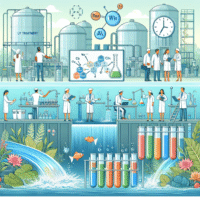Solar Water Disinfection

Access to safe, clean drinking water is a basic necessity that billions around the world still lack. Contaminated water continues to spread life-threatening diseases like cholera, dysentery and diarrheal infections – a leading cause of childhood mortality in developing nations. While large-scale sanitization infrastructure has expanded, many remote and impoverished communities remain without reliable water purification systems.
However, a deceptively simple technology holds the power to disinfect contaminated water using just recycled plastic bottles and the sun’s radiant energy. Known as solar water disinfection (SODIS), this method provides an economical, user-friendly solution to securing safe drinking water for the world’s most vulnerable populations.
How SODIS Defeats Deadly Pathogens
The science behind SODIS harnesses dual purification mechanisms from sunlight – intense heat and ultraviolet radiation. As water in the bottles warms above 50°C (122°F), proteins within bacteria and viruses begin denaturing, halting their replication. This thermal inactivation also destroys dangerous protozoa and parasitic cysts.
Simultaneously, the sun’s UV-A rays penetrate the clear bottles, damaging microbes’ DNA and RNA strands. This genetic mutation creates debilitating pyrimidine dimers that prevent pathogens from reproducing, eventually killing them after 6 hours of solar exposure.
Numerous lab and field studies have validated SODIS’ remarkable disinfection power against all major waterborne disease agents plaguing developing regions. These include bacterial culprits like Cholera, Salmonella, E. coli, and Shigella; viral threats like rotavirus and polio; parasitic infections from Cryptosporidium, Giardia and intestinal worms.
A Legacy of Life-Changing Impact
The genesis of SODIS traces back to Swiss researchers in the 1980s stumbling upon the fact that sunlight can sterilize contaminated water in transparent containers. Systematic experiments soon characterized this effect as a dependable, low-cost solution for the developing world’s vulnerable populations.
Over the past 30 years, SODIS has empowered over 6 million people across 50 nations to access safe drinking water purely through distributed solar power. Its true strength lies in needing no elaborate infrastructure or consumables. Communities can manufacture “solar reactors” from discarded PET bottles already ubiquitous across waste streams worldwide.
Epidemiological studies consistently demonstrate SODIS’ transformative potential. Disseminating straightforward usage training achieves measured reductions in diarrheal disease incidence between 30-70% within adopting communities. This massively reduces childhood mortality, malnutrition, stunted growth and lost educational opportunities tied to repeated infection cycles.
Mothers and young girls especially benefit, gaining back hours weekly previously consumed fetching firewood and boiling water for decontamination. Overall family productivity climbs as fewer workdays are forfeited to diarrheal sickness. Economists calculate the comprehensive socioeconomic returns reaped within impoverished adopting villages far exceed the minimal implementation costs.
Applying SODIS Effectively
While the core technology is elegantly rudimentary, proper SODIS usage does require adhering to some best practices for reliable results:
- Use clean transparent bottles made of PET, polycarbonate or other UV-transmissive plastics of 0.5-2L size
- Fill bottles with raw water, close lids securely, then shake to oxygenate and disperse particles
- Expose the bottles horizontally on a dark surface to maximize direct sunlight absorption
- Target 6 hours of sunlight exposure between 10am-4pm on clear days (UV index of 4-5 ideal)
- Pre-treat turbid water through filtering, decanting or coagulation, if necessary
- Properly store SODIS bottles overnight before drinking to allow any residual oxidants to dissipate
- Replace bottles every 1-2 years as scratches and UV exposure can degrade plastic over time
Following these steps tailored to local conditions ensures maximal microbiological decontamination and pathogen inactivation for safe consumption of SODIS-treated water.
The Future of Democratizing Clean Water
Looking ahead, SODIS represents an unprecedented opportunity to decentralize and democratize access to safe water globally. Further refinements like UV-resistant water pouches and low-cost solar exposure indicators can optimize this grass-roots solution for unique cultural contexts.
Even today however, SODIS tackles one of humanity’s greatest public health crises using only recycled plastic and sunlight – two widely available resources reachable even by the world’s most marginalized communities. Its revolutionary potential to empower impoverished families with water security forever transforms this vital resource from an often-unattainable need into a basic human right.


